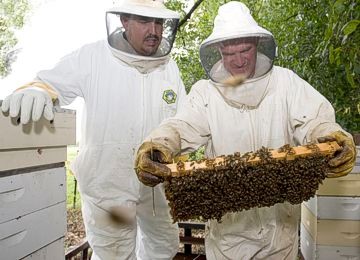Apiary Inspections

The most frequent question about apiary inspections is "Why do I need to have my apiary inspected?" The simple answer is to keep your bees healthy and productive. Any beekeeper in the state can request to have their apiary inspected. Any honey bees or used beekeeping equipment must be inspected by an appropriate official of the state and certified to be apparently free of infectious or contagious regulated bee diseases and pests prior to being moved into or within the State of Tennessee.
The state apiarist, assisted by the apiary inspectors has the authority and responsibility to establish and implement a program for inspection of apiaries throughout the state for the purpose of detecting regulated bee diseases and pests and for implementing control measures as needed to minimize the adverse impacts of those diseases and pests on the honeybee population in the state. The apiary inspection program will be conducted in accordance with standard procedures that are developed by the state apiarist. The state apiarist may require or supervise the treatment, destruction, or disposition of diseased bees or contaminated bee equipment or bee supplies. Any apiary inspector duly authorized by the state apiarist has the authority to go upon any public or private property for the purpose of conducting an inspection of an apiary located on that property. The inspector shall make a reasonable effort to notify the beekeeper of a planned inspection prior to the actual inspection.
Anyone selling colonies, nucs, packages, queens, used equipment or appliances must be inspected by an appropriate official of the state and certified to be apparently free of infectious or contagious regulated bee diseases and pests. All persons desiring to move bees, hives, slumgums, used beekeeping equipment or appliances into the state must apply to the department for a permit. Such application shall be accompanied by a certificate of health certifying that all bees, hives, slumgums, used beekeeping equipment or appliances have been inspected by an authorized official within thirty (30) days prior to transportation into Tennessee, and that such bees, hives, slumgums, used beekeeping equipment or appliances were found apparently free from any regulated diseases or pests.
No bees may be sold, offered for sale, moved, or transported, shipped or delivered within the state, unless they have been inspected by an appropriate official of the state and certified to be apparently free of infectious or contagious regulated bee diseases and pests.
If a beekeeper knows that a colony of bees has a regulated bee disease or pest, the beekeeper shall immediately report to a state apiary inspector all facts known about the bee's disease or bee's pests.
If any apiary inspector has substantial reason to believe that a feral colony of bees may be harboring any regulated bee disease or pest, the inspector has the authority to enter onto any property public or private to locate and examine that feral colony of bees. The examination of a feral colony and any subsequent regulatory activity must be conducted in accordance with rules established by the department.